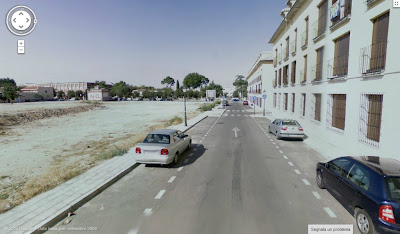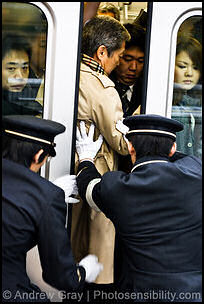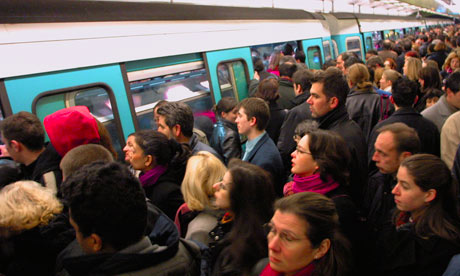The highlight of my week is Friday afternoon, when I look after the two most delightful children: 6-year-old Sarah and 4-year-old Xavier. The family is from Martinique, in the French Caribbean, and their walls are decorated with photos of family members sitting on tropical beaches, their fruit bowl is always full of bananas and clementines, and the mother makes pancakes with rum for the children.
I speak to Sarah and Xavier in English, although they speak to me in French. They are not at all fazed by the language difference - in fact, they barely seem to notice it. It helps that a lot of conversation with children of that age is about concrete, practical matters, which can be helped along with gestures:
“Where are your gloves?”
“Put your shoes here.”
“Hang up your towel.”
“Let’s go and wash our hands.”
“Do you want me to cut the apple up?”
etc.
It doesn't escape them that I'm speaking a different language, though. The first time I looked after them, Sarah
looked up from the drawing she was doing and gave me an impish smile.
“You speak
English,” she informed me.
“Yes, I
do,” I replied.
“Julie
spoke English,” she said, going back to her drawing. (Julie was their last
babysitter.)
Xavier
looked at me quizzically.
“Why do you
speak English?” he demanded.
“Julie had
blonde hair,” said Sarah. “She was from the United States. Are you from the
United States?”
On another occasion, Sarah asked me to do her hair, but I wasn't doing it the way she wanted it.
“It's very difficult,” she told me in a comprehending tone of voice. “Because you speak English and I speak French” She shook her head. “It would be so much easier if we both spoke the same language,” she sighed.
Every week I make my way home laughing out loud at the gems Sarah and Xavier come up with. Here are some of them to brighten your day too.
THE WORLD ACCORDING TO SARAH AND XAVIER
1) Wolves
“There are no snails,” lamented Xavier, as we walked home from the park. “No snails anywhere. Because when I say ‘Aaah!’ they hide in their shells.”
“The wolves ate all the snails,” Sarah informed him. Then she turned to me. “Do you know what eats humans? Wolves. But there are no wolves in France anymore. Do you know where they are now?”
“Where?” asked Xavier.
“At the north pole,” Sarah said.
2) Caries
Sarah opened
a pot of natural yoghurt, seized the sugar, and proceeded to pour such a
quantity of sugar onto the yoghurt that it almost overflowed out of the pot.
“Hey!” I
said. “That’s enough!”
Sarah
looked up at me. “Too much sugar?” she beamed.
“It’ll rot
your teeth!” I told her, tapping my teeth to make the point.
“It gives
you caries!” shouted Xavier excitedly, bouncing up and down in his chair.
“Yes,”
replied Sarah sagely. “The caries in your mouth eat sugar. It’s their meal. Mmm!” And she rubbed her tummy
delightedly.
“Sugar
gives you caries!” Xavier repeated, standing on his chair and jumping off it.
“Caries
live in your mouth,” Sarah told me. “Then they eat sugar and grow bigger.”
3) The danger of bean chilli
Later that evening, as I was dishing up their dinner, Xavier wandered into the kitchen. He tipped the pot of bean chilli towards him, studied the contents, and wrinkled his nose.
“I don’t eat that,” he declared. “It’s not healthy.”
4) Cats and breathing underwater
As we came back from the park, a cat ran out from under a parked car.
“Why are cats afraid of cars?” asked Xavier.
“Because they make a noise,” I replied.
This level of English was clearly beyond Xavier, but he was not put out.
“Because they think that they’re going to kill them?” he said.
“You know,” mused Sarah, “there are people who eat cats.”
“Where?” demanded Xavier, horrified.
“I don’t know…” she replied thoughtfully. “In India…”
And that was enough about cats. Next topic.
“When I was a little baby, I was in my maman’s tummy,” Xavier informed me. “At the beach.”
“Yes,” Sarah chimed in, “because Xavier was born in France and I was born in Martinique. The waves make you do this,” and she demonstrated rocking backwards and forwards, holding her nose. “And you can breathe underwater.”
GOING TO THE PARK
1) What colour is the sky?
As we wandered down to the park one evening, Xavier came to a screeching halt and nearly fell off his bicycle.
“Look!” he exclaimed. “The sky is blue!”
Sarah regarded the sky thoughtfully. “I don't think it is,” she replied.“I think it is black.” They both stood there considering the night sky. Then Sarah turned to me.
“What do you think?” she asked.
Fortunately, colours can be compromised upon.
“I think it’s very dark blue,” I said. “So dark as to be almost black.”
And they seemed satisfied with that.
2) Cold hands
It was a chilly evening at the park, and while Xavier had gloves, Sarah did not, and her hands were freezing.
“Will you lend me your gloves?” she asked Xavier.
Any other four-year-old in the world would have said no, but Xavier took his gloves off and gave them to his sister, without a moment’s hesitation.
A little while later, Xavier started to feel the chill in his fingers.
“Will you give me back my gloves?” he asked Sarah.
“But– ” she hesitated. “But then my hands will be cold.”
“But my hands are cold,” said Xavier.
Do you see that? He didn’t say “But they’re my gloves. You’re only wearing them because I lent them to you and now you have to give them back because I say so.” He said “My hands are cold.”
Eventually they decided to wear one glove each.
“We’ll share,” said Sarah as she took a glove off. “Because we’re brother and sister.”
“Yes,” echoed Xavier. “We’re brother and sister.”
On another chilly afternoon when we were out, Xavier’s hat started falling off because the buckle under his chin had somehow undone itself. I stopped to do up the buckle, taking off my gloves to make the operation easier.
“But,” said Xavier, looking uneasily at my ungloved hands. “But… you’ll be cold!”
3) Escargots
It’s always a workout for me when we go to the park. Xavier usually takes his bicycle, and goes wobbling along on it at an astonishing pace, while Sarah runs like the wind, and I end up running after them, shouting at them to stop when they get to the road.
One time, Xavier was pottering along, more slowly than usual, when Sarah came trotting up behind him. Just at that moment, he came to a standstill while he made some observation about the scenery, whereupon Sarah collided with his back tyre.
“Come on, Xavier,” she chided him. “We are not escargots!”
Another time, when Xavier didn’t have his bicycle, he was walking next to me and watching Sarah as she charged down to the end of the road.
“Sarah runs very fast,” he observed. “She always wins races.” He paused thoughtfully and then informed me gravely, “I run slowly. But I sweat.”
COMING BACK FROM THE PARK
1) You always want to win!
When we get home, Sarah usually goes charging up the stairs to their apartment on the fourth floor, while Xavier stares mournfully after her.
“You always want to win,” he moans. “I’m not even racing.”
When we get to the top, he stamps his feet and says, “It’s not fair! You always want to win!”
“But I thought you weren’t racing,” replies Sarah breezily.
2) Flowers and phone calls
When spring
began, the park was liberally dotted with a variety of wild flowers, and
Sarah started picking them to make a bouquet. Then she delegated the task to
me.
“That one!”
she instructed. “And now those ones. And make sure the yellow one has a long
stem, and tie it around the stems of the others.”
Shortly
afterwards, she commandeered my phone. I kept her under close surveillance as
she merrily pressed all the buttons.
“I know
lots of things about your phone now!” she informed me. “Hello? Hello?” she
chirped into the phone. “What’s your name? What’s your name? Yes, this is Sarah.”
Then I
turned my head for a second, and when I looked back, she was dialling my mother’s
number. I seized the phone back and quickly cancelled the call.
“That was
my mother you were calling!” I told her. “What were you going to say to her?
Were you going to speak to her in English?”
“It was
your mother?” said Sarah cheerfully. “And who are all these people?” as she
scrolled through the address book.
“My family
and friends,” I said.
“I’m going
to call them all,” she told me. “I’m going to call your mother and your father
and your brother and your sister and your grandmother and your grandfather…”
“Do you
want to phone your mother?” I asked.
“Yes! Yes!”
she said excitedly.
So I let
her call her mother.
“I’ve made
a beautiful bouquet,” she gushed into the phone. “There are red flowers and yellow flowers
and –” she paused to check the bunch “– and white flowers and blue flowers and some that
are not flowers, they’re leaves, but it’s OK because it matches. When are you
coming home?”
She put the
phone down.
“She’s nearly home,” she informed me.
Then we got
home. As we went upstairs to the apartment, Xavier started bouncing up and down
in front of me.
“Can I hold
the keys?” he said excitedly. “Can I hold the keys?”
I gave him
the keys.
“Because it’s
my dream,” he told me solemnly, then he clutched the keys to his breast and charged up the stairs.
Once we were home, Xavier disappeared into the bathroom. A good quarter of an hour later, when he still hadn't emerged, I went to see what he was up to. I found him staring up at the cupboard door, a towel hanging from his hand and a despondent look on his face.
"What are you doing?" I asked.
"I'm trying to hang the towel on the door," he whispered.
The cupboard was a floor-to-ceiling affair, and even the average adult would have to stand on a chair to reach the top of it. And little Xavier, aged four, was not going to rest until he had hung his towel over the door.
3) Sheep
Sarah tends
to keep up a continuous patter of discourse, which is delightful to listen to
but which I don’t always manage to follow with any great degree of
comprehension. In the middle of one of these monologues (in which I believe she
was recounting some outing to the shops with her mother), she turned to me and
asked, “Have you ever been alone with a sheep?”
Now I know
she can’t have said that. Why on earth would she have wanted to know if I’d
ever been alone with a sheep? I must have misheard. In any case, she didn’t
wait for my reply and charged straight on with her story, but I spent the next
two hours puzzling over what she had said, without coming to any sort of
conclusion.
TALKING TO STRANGERS
“Bonjour
Madame Monsieur,” sang out Xavier merrily, to nobody in particular, as he
stomped along the path to the park. He turned to me and pointed an accusing
finger. “You’re called Madame!” he informed me. Then he pointed at a woman
walking past in the opposite direction. “You’re called Madame!” he informed
her.
I sat on a
bench in the park and watched the children playing on the climbing frame. Then
Xavier came bouncing up to me and told me, “I want a sweet.”
“I’m sorry,
I don’t have any sweets,” I said.
Seconds
later, I saw him approaching some teenage girls on another bench, who were
working their way through a packet of jelly babies. I half wondered whether I
should reproach Xavier for breaking the golden rule of childhood – don’t accept
sweets from strangers – but I decided to let it slip for this time, especially
after seeing how enchanted the girls were by him. A moment later, he reappeared
at my side, offering me a fluorescent green jelly baby.
On the way
back, a bus sailed past us. Seconds later, a woman came careering along, eyes
fixed desperately on the bus.
“Why are
you running?” Sarah demanded of the woman as she hurtled past.
“To get the
bus!” the woman called back over her shoulder.
A little
further on, we passed a man going in the opposite direction. Xavier looked him
up and down.
“Bonjour,”
he said.
“Bonjour,”
the man replied with a smile.
Xavier
broke down into giggles and clutched at my hand.
“I said
bonjour to the monsieur!” he chuckled.
TEN
Every now and then, the children will spontaneously come out with something in English. Sarah came home from school one day spouting “Yes I do!” and “No I don't!” and used one or the other as a reply to every question for the rest of the day.
The one
thing Sarah is very enthusiastic about is counting in English. At
every opportunity, she will start singing out “One! Two! Three! Five! Four!
Five!”
She was
going up the stairs one day, counting them as she went.
“Eight!
Nine! Ten!” she shouted triumphantly as she reached the top. Then she turned to
me with a concerned look on her face.
“How many
is ten?” she asked.
BON APPETIT
“Bon appétit, everybody,” Xavier sang out as he sat down to his afternoon snack.
“You can’t say bon appétit,” Sarah chided him. “It isn’t lunchtime.”
“You can,” called out their father, who was listening in from his study. “You can say it any time you want.”
“Even in the afternoon?” asked Sarah suspiciously.
“Yes,” her father said. “Any time.”
WHEN I'M BIG
Xavier has
great plans for when he grows up.
“When I’m
big,” he shouted out excitedly as he tried to swing himself, “I’m going to have
a fighter plane. And everyone is
going to go on my fighter plane!”
And as I
was trying to put on his shoes while he was trying to walk across the room:
“When I’m 17, I’m going to be taller than my papa!”
And as he
was sitting at the dining room table eating slice after slice after slice of
apple: “When I’m grown up, I’m going to dress up as an eagle and I’m going to
eat only fish!”
“You’ll have to eat pigeons too,” Sarah told him sagely, “because eagles eat
pigeons too.”
AND ONE LAST THING
I found this assertion quietly hiding in the midst of my notes on Sarah and Xavier's antics. I don't know what it is or where it came from, but given that it's there, I suppose I might as well share it with you.
The instrument must
be calibrated on the nitrogen peak (28 a.m.u.) and the calibration factor must be reported in the
documentation.



























